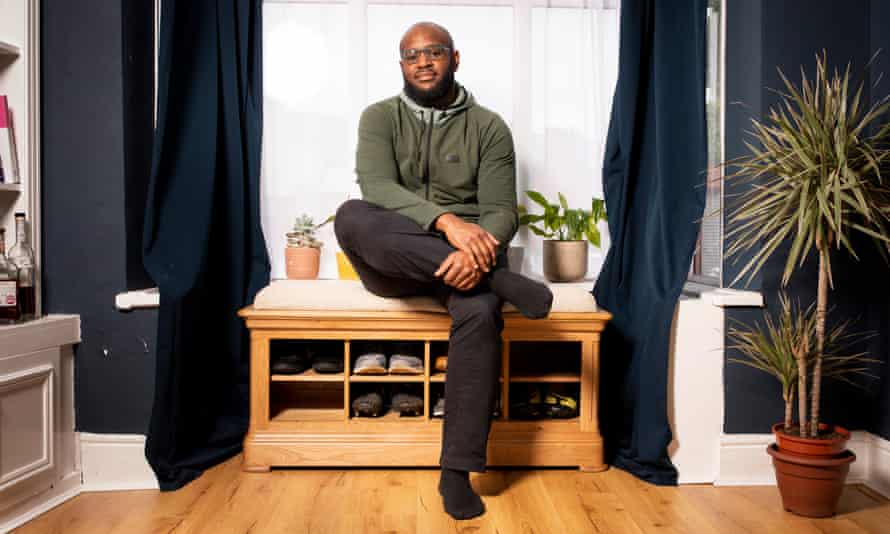
In February 2015, Niyah Campbell was studying for a master’s degree in health psychology at Aston University in Birmingham. His supervisor suggested that, for his research project, he might like to carry out a study into whether walking football – which plays the game at a slower pace – made sport accessible for older adults. He was intrigued. Campbell coached football as a teenager, still plays up to three times a week in a local league, and is a Birmingham City supporter.
Campbell recruited 20 adults for the study, all aged 60 or above, and arranged for weekly sessions on Thursday evenings at a five-a-side-pitch on the university campus. “I was quite intrigued,” Campbell says. “Heading down there for the first session, I didn’t know what to expect.” For the first couple of sessions, the players found it a challenge not to run for the ball. “It feels unnatural,” Campbell says, “to see the ball go past and not run after it. But if you run, it’s a foul. So at first there was a lot of blowing the whistle.”
Over time, people got the hang of it, and when the initial 12-week study came to an end, nobody wanted to disband the team – least of all Campbell. He offered to continue organising the games. “But I’m not going to lie,” says Campbell, who is now 32 and works as a health and social care researcher, “I didn’t think we would still be going seven years later.”
A few people have dropped out, but the team still meet every Thursday for a knockabout. “For me,” Campbell says, “it’s always been about enabling them to continue to participate. It’s exercise, but it’s also that light-touch social interaction that people really need, and the team really see the value of that. I enjoy facilitating them to have that space.”
It’s also satisfying, Campbell says, from a coaching perspective: “The football has got significantly better over the past few years. This is great, because when you’re older, you have fewer opportunities to build skills. When some of these guys first started, it made their week if they scored a goal. Whereas now they might score a hat-trick, because they have built those skills.”
Team member John Caffrey says: “Niyah continues to run the session every week, despite the grumbles that referees have to put up with from footballers, who are notoriously bolshie. We think he is absolutely brilliant and a true Guardian angel.”
Campbell worries that the team thinks he’s doing it out of charity, but he’s not. “I’ve never seen it as a burden,” he says. At a team Christmas dinner in 2016, he told them as much. “I stood up and did a speech,” he remembers, “and said: ‘If someone came up to me and said I’ll take the walking football off your hands, I’d tell them to get lost. I really enjoy it.’”
Campbell says he has learned a lot from spending time with the older generation, and they from him: “I genuinely look at them and think that these are eight or nine blokes who are old enough to be my grandad. And they’ve seen me grow up from a 25-year-old student to a 32-year-old with his own house and a career.”
After-game drinks in the pub can sometimes get fruity. “We live in a time where there isn’t much overlap between people with different political opinions,” he says. “You’re either a boomer or a snowflake. People don’t want to have conversations. Don’t get me wrong – I don’t want it to be prime minister’s questions every time we go to the pub. I try to enforce a limit on how much politics we talk! But the team does present an opportunity to interact with people who have a different perspective on life.”
The team talks about politics, and race. “As older white gentlemen,” Campbell says, “they probably haven’t had much of an opportunity to engage with Black men my age. So walking football is good for that intergenerational mixing of cultures.” He welcomes women to join in too.
During the pandemic lockdowns, Campbell organised weekly Zoom calls with the team, in lieu of in-person training. “I know the lads were particularly grateful for that,” he says. “They said to me: ‘When I play football, Thursday afternoon is my favourite time. And now we aren’t playing football, it’s still my favourite time.’”
Sign up to our Inside Saturday newsletter for an exclusive behind-the-scenes look at the making of the magazine’s biggest features, as well as a curated list of our weekly highlights.
When asked for his treat, Campbell mentions that he and his girlfriend have recently bought a house: “Getting things together and sorting out the garden and all the repairs has been a bit ridiculous. But now we’re at the point where we can invite people over, it would be nice to finish off the place.” Because there’s not that much storage space in the house, he’s had his eyes on a shoe rack for a while. “Where to keep shoes is always an issue,” he says.
Oak Furnitureland provides them with a padded rack that doubles as a bench. They’ve put it in a bay window, and as well as housing Campbell’s football boots and Air Jordans, it will provide much-needed extra seating for guests, or even a quiet corner for reading. “We’re very happy with it,” says Campbell.
Want to nominate someone for Guardian angel? Email us – with their permission – and suggest a treat at [email protected]



